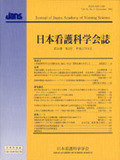Japanese
English
- 販売していません
- Abstract 文献概要
- 参考文献 Reference
- サイト内被引用 Cited by
要旨
本研究は, 老年期に痴呆症という病を生きる体験とはどのようなものかを明らかにすることを目的とした. 痴呆性高齢者専門グループホームでケアに参加しながら44日間のフィールドワークを行い, 情報提供者14名に起こった出来事, 会話, 表情, ふるまいの観察記録, 日記をデータとし, グループホームの日誌, 家族と援助員の話を補足データとした. データの意味を解釈し共通する内容をテーマとした. その結果,《痴呆症という病の始まり》《我が家への思い》《閉ざされた感覚》《自分が存在しない》《他者との関係に見える情けない自分》《何もわからなくなる自分と折り合うための対処》《生きる支え》の7つのテーマが抽出された. 老年期に痴呆症という病を生きる体験は, 自己の存在が不確かになる中で, 再び自己の存在の確かさを求めてゆく過程であることが示唆された.
Abstract
This study explores the experience of people suffering from senile dementia syndrome. The study was conducted during a 44-day fieldwork project at a group home for people with dementia. Data were collected on events, conversations, facial expressions, behavior, and from the diaries of 14 informants; supplementary data were also collected from care diaries and interviews with their families and care staff. We interpreted and categorized the data into seven themes: “the onset of the disease called dementia,” “the wish to stay in their own home,” “the trapped feeling,” “the non-existence of themselves,” “the pitiful self that is revealed in the relationship with others,” “coping with themselves as they become unable to understand anything,” and “the emotional sustenance for living.” We suggest that the experience of people suffering from senile dementia syndrome reveals a process by which validation of their own existence is sought as their own existence becomes uncertain.
Copyright © 2005, Japan Academy of Nursing Science. All rights reserved.


